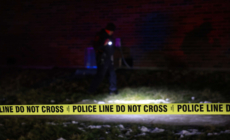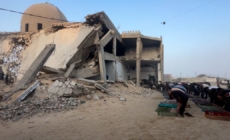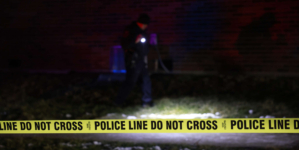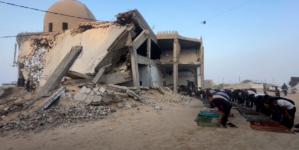-
How to Watch UFC 316 Prelims: Live Stream Merab Dvalishvili vs Sean O’Malley 2 Undercard - 11 mins ago
-
Christy Carlson Romano reveals shocking details about nearly losing her eye - 16 mins ago
-
The 'Belmont Stakes on FOX' crew make their picks for the winner of the Belmont Stakes - 25 mins ago
-
Missing Denver Hairstylist Found Dead After Two-Month Search—Family - 51 mins ago
-
Dodgers vs. Cardinals Highlights | MLB on FOX - about 1 hour ago
-
Eagles DC Delivers Confident Message After Critical Losses - about 1 hour ago
-
Gaza families mark Eid al-Adha amid destruction and loss - 2 hours ago
-
A. P. Kid wins 2025 Pennine Ridge Stakes - 2 hours ago
-
Chaos erupts at Paramount Home Depot as protesters confront ICE - 2 hours ago
-
Riley Gaines and Simone Biles Beef Online Amid Trans Athlete Debate - 2 hours ago
US Friends and Foes in Syria Respond to Trump Reducing Troops
President Donald Trump’s decision to reduce the presence of U.S. forces in Syria has drawn mixed reactions among local factions, with U.S. partners expressing to Newsweek that threats remain and critics arguing the move does not go far enough.
After months of speculation over whether Trump would move to fulfill his first-term goal of pulling troops out of Syria, the Pentagon announced Friday that it would begin a “consolidation” of the U.S. military presence in the country. The process would reportedly shutter three bases and bring the number of troops down to less than 1,000, closer aligning to the number of troops deployed to Syria before then-President Joe Biden’s increase to 2,500 personnel, announced in December.
The U.S. presence in Syria is largely divided between the self-proclaimed Autonomous Administration of North and East Syria, controlled by the Kurdish-led Syrian Democratic Forces (SDF), and a garrison in the southeastern desert region of Al-Tanf, manned by the Syrian Free Army rebel militia.
Both U.S.-backed groups have expressed their continued support for their ally’s presence even as they’ve moved to integrate themselves into the Islamist-led coalition that toppled longtime Syrian President Bashar al-Assad in December.
But questions linger as to the goals of U.S. troops in the country, whose new rulers—as with the old government and its supporters—consider their presence to be an illegal occupation.
Combined Joint Task Force – Operation Inherent Resolve/U.S. Army/Staff Sergeant Tyler Matz
In light of the news of a U.S. drawdown, Sinam Mohamad, representative of the SDF’s political wing, the Syrian Democratic Council, in Washington, pointed to the lasting value of the U.S. presence in the country, given the lingering threat posed by the Islamic State militant group (ISIS).
“The presence of the American troops is essential when we see the resurgence of ISIS is a threat to the whole region and the prisons that hold thousands of ISIS fighters in addition to the camps that holds the families of ISIS is still a threat,” Mohamad told Newsweek. “We believe that the U.S. troops will help toward any threat from ISIS.”
The fate of these prisons remains in question after the SDF struck a deal last month to join the central government led by new Syrian Interim President Ahmad al-Sharaa, former head of Islamist militant group Hayat Tahrir al-Sham. Mohamad argued that the agreement “is going forward in a good way” thus far, and “we hope to have a decentralized system in Syria to keep a sustainable peace and stability.”
The SDF has continued to clash, however, with other former opposition groups who helped to overthrow Assad, particularly the Turkey-backed Syrian National Army. The violence has come despite Ankara reaching a ceasefire deal last month with the separatist Kurdistan Workers’ Party (PKK), which has ties to the SDF.
The Syrian Free Army, whose commander told Newsweek in January that U.S. troops continued to serve a key role in the fight against ISIS, had also announced its intentions to join the new government led by Sharaa in February, though it continues to train with U.S. troops.
While Sharaa has sought to improve ties with the U.S. since leading the charge to topple Assad, he has stated that the current presence of U.S. forces did not adhere to international law due to a lack of agreements between Damascus and Washington.
The U.S. played a role in overseeing the deal between Sharaa’s new government and the SDF, but he is still designated as a terrorist by Washington due to his past affiliation with Hayat Tahrir al-Sham and its Al-Qaeda-linked predecessors.
Newsweek has reached out to the Syrian Information Ministry and the Syrian Free Army for comment.
Others have adopted a stronger position against the U.S. military presence. The group known as the Syrian Islamic Resistance Front Uli al-Baas, which is involved in operations against Israeli troops who seized additional territory in southern Syria after Assad’s ouster, was skeptical that the U.S. move represented a broader shift in strategy.
“First, understanding the workings of the American administration clarifies the reality of this decision and clearly demonstrates the role played by successive American administrations in Syria and the extent of coordination and guidance provided by the ruling authority in Damascus,” the political office of Uli al-Baas told Newsweek.
“Trump made a very similar decision during his first term,” the group continued, “but its implementation is contingent on political realities and considerations specific to American interests.”
Trump announced in late 2018 that he would begin the full withdrawal of U.S. troops in Syria. With ISIS largely defeated by the following year due to separate campaigns waged by the U.S.-backed SDF and Assad, who was supported by Iran and Russia, Trump began to order U.S. forces out of a number of positions across northern Syria in a 2019 deal with Turkey.
That same year, however, U.S. troops in Syria and neighboring Iraq increasingly clashed with local militias aligned with Iran, escalating to the point of Trump ordering the killing of Iran’s Islamic Revolutionary Guard Corps Quds Force chief Major General Qassem Soleimani in Baghdad in 2020.
Tensions again erupted under the Biden administration as regional militias participating in the Iran-led Axis of Resistance coalition began targeting U.S. positions due to Washington’s support for Israel in its war against the Palestinian Hamas movement in Gaza.
Uli al-Baas argues it is independent of any other local or external actors, though it describes itself as part of the Axis of Resistance. With the Iran-led coalition damaged over the downfall of Assad and blows suffered by Lebanon’s Hezbollah in its war with Israel, Uli al-Baas argued that the U.S. was deliberately seeking to keep Syria in disarray.
“The minimal withdrawal and closure of only three operational bases represent a new geographic balance in Syria at the expense of the independence and territorial integrity of Syria,” Uli al-Baas said. “The American regime is working to steal Syrian wealth, secure vital supplies for the Israeli entity and impose a chaotic reality that serves the interests of the tutelage states.”
Uli al-Baas also echoed the claims long expressed by the former Syrian government of U.S. plundering of Syrian natural resources, particularly as much of the U.S. presence in the northeast centers around oil and gas fields. Now, however, the group argued that the U.S. was in an even weaker position to enforce its posture as a result of political wrangling at home.
“Every claim the American administration suggests is merely a projection of an unrealistic image of the goals and ambitions of the American project, not only in Syria but also across the region,” the group said. “We believe that the American presence has become weaker than before due to domestic American needs and also new factors that will alter the American approach to hegemony and supremacy over the peoples of the region, including Syria.”
Unlike the SDF and Syrian Free Army, Uli al-Baas does not claim formal control over territory in Syria, though it has intensified operations against Israeli troops in recent weeks.
An Israeli military official recently confirmed to Newsweek a number of clashes between Israeli troops and militias in southern Syria, where Israeli Defense Minister Israel Katz announced last week his forces would remain indefinitely, as they would in parts of Gaza and Lebanon in the midst of the ongoing regional conflict.
Israeli officials have maintained their actions in Syria were taken to minimize the potential threat posed by the country’s new government. Still, the raids have drawn significant criticism throughout the Middle East.
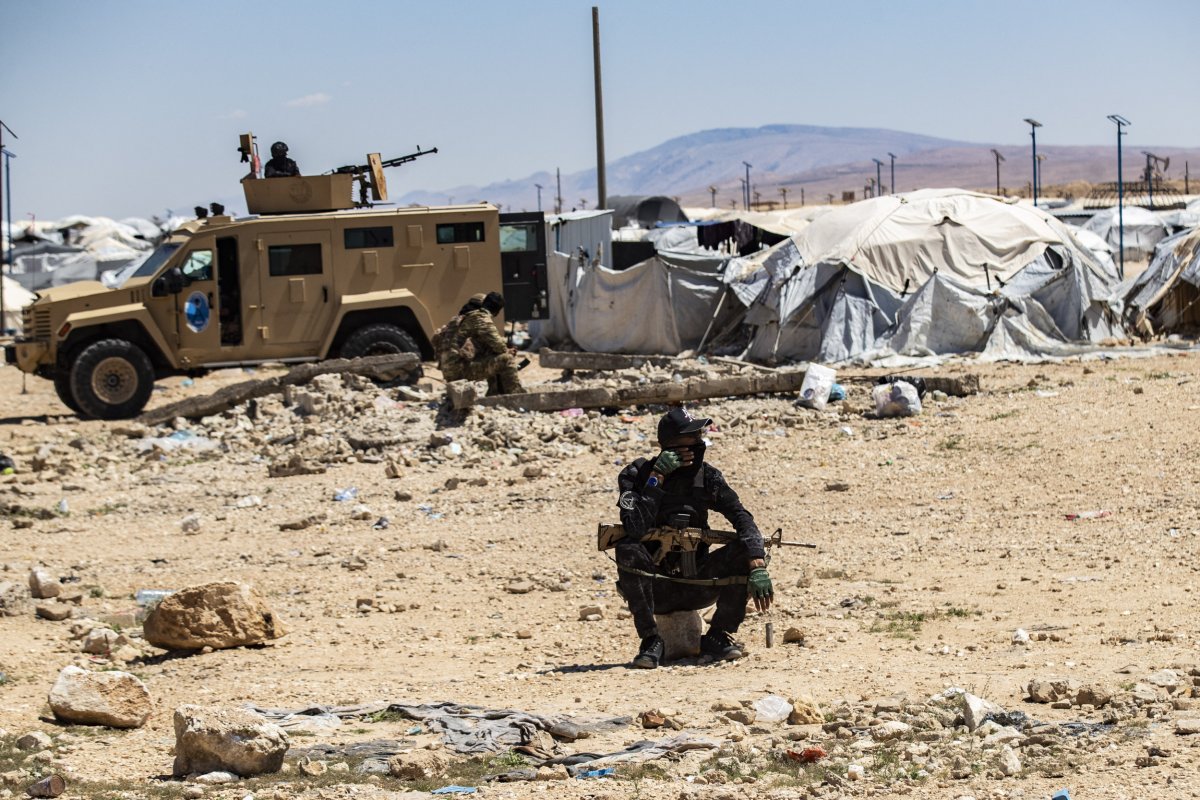
Delil Souleiman/AFP/Getty Images
While Sharaa has condemned the Israeli presence and regular strikes conducted by Israeli warplanes in Syria, he has not publicly ordered any retaliatory measures. The lack of action has led to accusations by Uli al-Baas of him being complicit in Israel’s actions, particularly after the arrest of two members of Palestinian Islamic Jihad, another Axis of Resistance faction involved directly in the war with Israel, on Tuesday.
Sharaa has, however, strengthened ties with Turkey, which has ramped up warnings against Israel over its actions in Syria, setting the stage for a potential escalation between two U.S. allies.
At a joint news conference with Israeli Prime Minister Benjamin Netanyahu, sometimes referred to by his nickname, Bibi, earlier this month, Trump expressed admiration for Turkish President Recep Tayyip Erdogan and offered to mediate between the Middle East leaders, as long as they would “be reasonable.”
“I said just, ‘Bibi, if you have a problem with Turkey, I really think I’m going to be able to work it out. You know, I have a very, very good relationship with Turkey and with their leader and I think we’ll be able to work it out,'” Trump said in response to a reporter’s question at the time.
Trump also credited Erdogan with a direct role in overthrowing Assad and having “taken over Syria,” despite the Turkish president’s denials that his nation was directly involved in the victorious insurgent offensive.
Yet the Trump administration appears to remain wary of direct engagement with Sharaa’s government, even as a number of influential figures in Washington, such as Senate Foreign Relations Committee chair James Risch of Idaho and ranking member Jeanne Shaheen of New Hampshire call for an easing of Assad-era sanctions.
Two other members of Congress, Representatives Cory Mills of Florida and Marlin Stutzman of Indiana, paid an unofficial visit to Syria on Friday, the same day that the Pentagon confirmed the reduction of the U.S. military presence in the country, to meet with representatives of the Syrian interim government.
Also on Friday, the U.S. Embassy in Syria, which has been closed since Washington cut ties with Damascus a year after the outbreak of the country’s civil war in 2011, warned that “the U.S. Department of State is tracking credible information related to potential imminent attacks, including locations frequented by tourists.”
“No part of Syria should be considered safe from violence,” the embassy wrote. “The Department reminds U.S. citizens that terrorists continue to plot kidnappings, bombings, and other attacks in Syria. They may conduct attacks with little or no warning, targeting public events, hotels, clubs, restaurants, places of worship, schools, parks, shopping malls, public transportation systems and areas where large crowds gather.”
“Methods of attack could include, but are not limited to, individual attackers, armed gunmen, or the use of explosive devices,” the embassy added.
Source link



